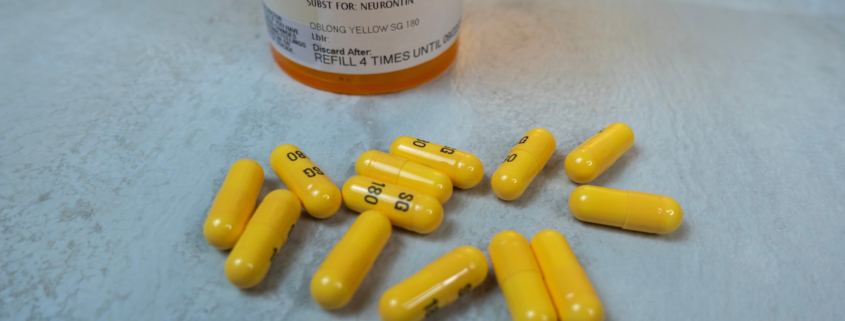Gabapentin Dependency and Withdrawal
Table of Contents
Gabapentin is an anticonvulsant drug that has been found to provide relief for a diverse array of health conditions. It is also a highly addictive substance that is often misused alongside other drugs like opioids. For this reason, gabapentin dependency and withdrawal will be the focus of this article.
What is Gabapentin?
Gabapentin is the generic anticonvulsant drug that is sold under the brand names Neurontin and Gralise. The drug is intended for the treatment of seizures, nerve pain, post-shingles neuralgia, and restless leg syndrome. It is also prescribed off-label for migraines and alcohol withdrawal.
Gabapentin has a similar structure to the neurotransmitter gamma-aminobutyric acid, or GABA, and has been found to reduce neural excitation. Because it is a central nervous system depressant, the calming effect also reduces pain signals, agitation, and anxiety. Daily doses range from 100-800 mg, and the drug’s half-life is 5-7 hours.
Side effects associated with gabapentin include:
- Mood swings
- Dizziness
- Abrupt changes in behavior
- Memory impairment
- Jerky movements
- Double vision
- Sleep problems
- Chest pain
- Fever
- Weight gain
- Swelling of feet or legs
- Suicidal thoughts
- Dependency or addiction
What Are Risks Associated with Gabapentin?
While gabapentin is a useful drug for the treatment of various conditions, extended use or misuse can have adverse effects. These include:
- Organ damage. Chronic use of gabapentin can result in liver, kidney, or brain damage.
- Dependency. Extended use of the drug can lead to chemical dependency in just three weeks.
- Overdose. There is a risk of overdose when the drug is combined with other substances or an excessive dose it taken.
About Gabapentin Abuse
In recent years, gabapentin has become associated with substance abuse. Gabapentin dependency and withdrawal effects are what commonly occur with prolonged use or misuse of the drug. This usually entails mixing the use of gabapentin with other drugs, such as opioids, alcohol, and cocaine.
A recent study showed that individuals with a history of mental health or substance use disorders are at higher risk of misusing gabapentin. In fact, a survey showed that while gabapentin misuse affected just 1.1% of the general population, it was 22% in an addiction treatment center. For this reason, healthcare providers are cautioned to consider the patient’s history before prescribing gabapentin.
Detox for Gabapentin Dependency
Someone who develops a physical dependence on gabapentin will begin having withdrawal symptoms when attempting to come off the drug. Gabapentin dependency and withdrawal is the result of the brain being used to having the drug in the system.
Once someone is dependent on this drug and decides to quit taking it, withdrawal symptoms emerge within 12-24 hours. However, symptoms may be delayed up to seven days after stopping the gabapentin.
Withdrawal symptoms occur because the brain and body become destabilized when the drug is withheld. As the body attempts to balance itself, there will be some discomfort.
To reduce the severity of detox for gabapentin addiction, a tapering schedule is prescribed. This simply means that you will take a smaller dose of the drug over a few days to help you taper off the drug. A taper can help prevent harsh symptoms.
Under the careful supervision of a medically trained detox team, you are monitored throughout the detox process. The doctor in charge of the detox will prescribe medications to assist with the symptoms and reduce discomfort.
Gabapentin Withdrawal Timeline
The withdrawal process will be unique to each person. Someone who was taking gabapentin for seizure control may experience many seizures during the detox. Someone who was misusing gabapentin and opioids together will have withdrawal symptoms for both drugs. The fact that withdrawal can present unforeseen effects is why it is advised to have medical oversight.
The medical detox process unfolds in three phases:
Phase One: Once withdrawal symptoms surface, the most severe will occur within the first 24 hours. These may include:
- Sweating
- Headaches
- Anxiety
- Blurred vision
- Breathing problems
- Heart palpitations
- Insomnia
- Tremors
- Uncontrolled seizures
- Hallucinations
- Suicidal thoughts
Phase Two: The second phase may produce these symptoms:
- Trembling
- Agitation
- Fever
- Fatigue
- Itchy skin
- Restlessness
- Muscle pain
- Mental confusion
- Anxiety
- Rapid heart rate
Phase Three: On days 4-5 symptoms may include:
- Mental confusion
- Light sensitivity
- Anxiety
Do You Need Gabapentin Addiction Treatment?
There are two scenarios where going to rehab is beneficial after the detox is completed:
- Gabapentin misuse has become compulsive, despite the negative effects on a person’s life.
- The person has co-occurring substance use disorder, such as opioid use disorder or alcohol use disorder.
In the event that either of these situations is present, a structured residential treatment program is advantageous to achieving long-term gabapentin abstinence. Rehab programs provide the coping skills and therapy to help the person overcome the addiction cycle.
Here is what a treatment program looks like:
- Individual therapy. In these one-to-one therapy sessions, you’ll examine what triggers tend to lead to drug seeking behaviors. Using CBT and/or DBT, you will learn healthy new ways to respond to the triggers.
- Group therapy. Small group therapy sessions meet to discuss topics that center around addiction and recovery.
- Trauma-informed therapy. A history of trauma is prevalent in a significant number of those who struggle with substance use. Trauma-informed therapy helps foster resilience while teaching useful coping skills.
- Addiction education. Classes help the person gain a better understanding about how the brain is affected by substances, allowing addiction to develop. Relapse prevention planning is also included in the classes.
- 12-Step program. Self-help groups like A.A. and SMART Recovery provide structure to the recovery process, as well as fellowship.
- Health and wellness. Nutrition, exercise and holistic activities, like meditation, yoga, and breath work, all contribute to restoring health in recovery.
Annandale Behavioral Health Provides Safe Gabapentin Detox and Withdrawal
Annandale Behavioral Health offers medical detox and comprehensive addiction recovery support for individuals struggling with gabapentin or polysubstance use disorder. Are you or someone you care about struggling with gabapentin dependency and withdrawal and are ready to break free? If so, please reach out today at (855) 778-8668.







